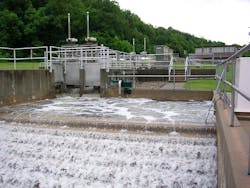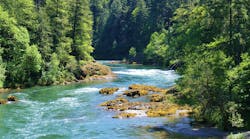Project to Develop Hydraulic Fracturing Water Treatment System
Southern Research Institute has entered into a contract with the Research Partnership to Secure Energy for America (RPSEA)—under the Unconventional Resources Program—to develop, and demonstrate the performance of technologies that will advance shale gas hydraulic fracturing water treatment in order to produce National Pollution Discharge Elimination System (NPDES) quality water. The project is being funded by the U.S. Department of Energy's Ultra-Deepwater and Unconventional Natural Gas and Other Petroleum Resources Research and Development Program established through the Energy Policy Act of 2005.
"The 2011 Unconventional Resources Program selections focus on research that will add to the ability to develop the natural gas endowment of the U.S. in an environmentally protective and safe manner," said Kent Perry, RPSEA vice president, Onshore Programs.
The two-year project will develop advanced technologies that address issues related to processes and methods for handling and disposal of large volumes of hydraulic fracturing flow-back water, as well as water produced during the longer-term production phase. The program will optimize four technologies—two for hydraulic fracturing water treatment and two for the treatment and disposal of residues (high solid slurry and membrane concentrate) from hydraulic fracturing water treatment.
"If successful in reducing the economic and environmental issues associated with shale gas production, this technology could have a major impact on energy security and sustainability in the U.S.," said Robert Dahlin, Ph.D., principle investigator and director of Southern Research Institute's Power Systems & Environmental Research Center (PSER) in Birmingham, Ala.
The hydraulic fracturing water treatment technologies are magnetic ballast clarification for removal of total suspended solids (TSS), metals and naturally occurring radioactive materials (NORMS), and vortex-generating and nano-filtration membranes for removal of TSS and/or total dissolved solids. The residue treatment/disposal technologies are hydrogel adsorbent for metals, NORMs, trace element removal, and precipitation, solidification and stabilization. Several combinations of the technologies can be envisioned and will be explored as part of this research project.
The program will be managed and executed by teams from Southern Research's Advanced Energy & Transportation Technologies Center in Durham, N.C., and the PSER operations in Birmingham, Ala., and Cartersville, Ga. Southern Research also teamed with partners from M2 Water Treatment Inc. in Raleigh, N.C., and BKT United in Anaheim, Calif., to conduct this work. Southern Research is interested in partnering with additional oil and gas industry leaders to further demonstrate, commercialize and deploy the technology.
Source: Southern Research Institute


